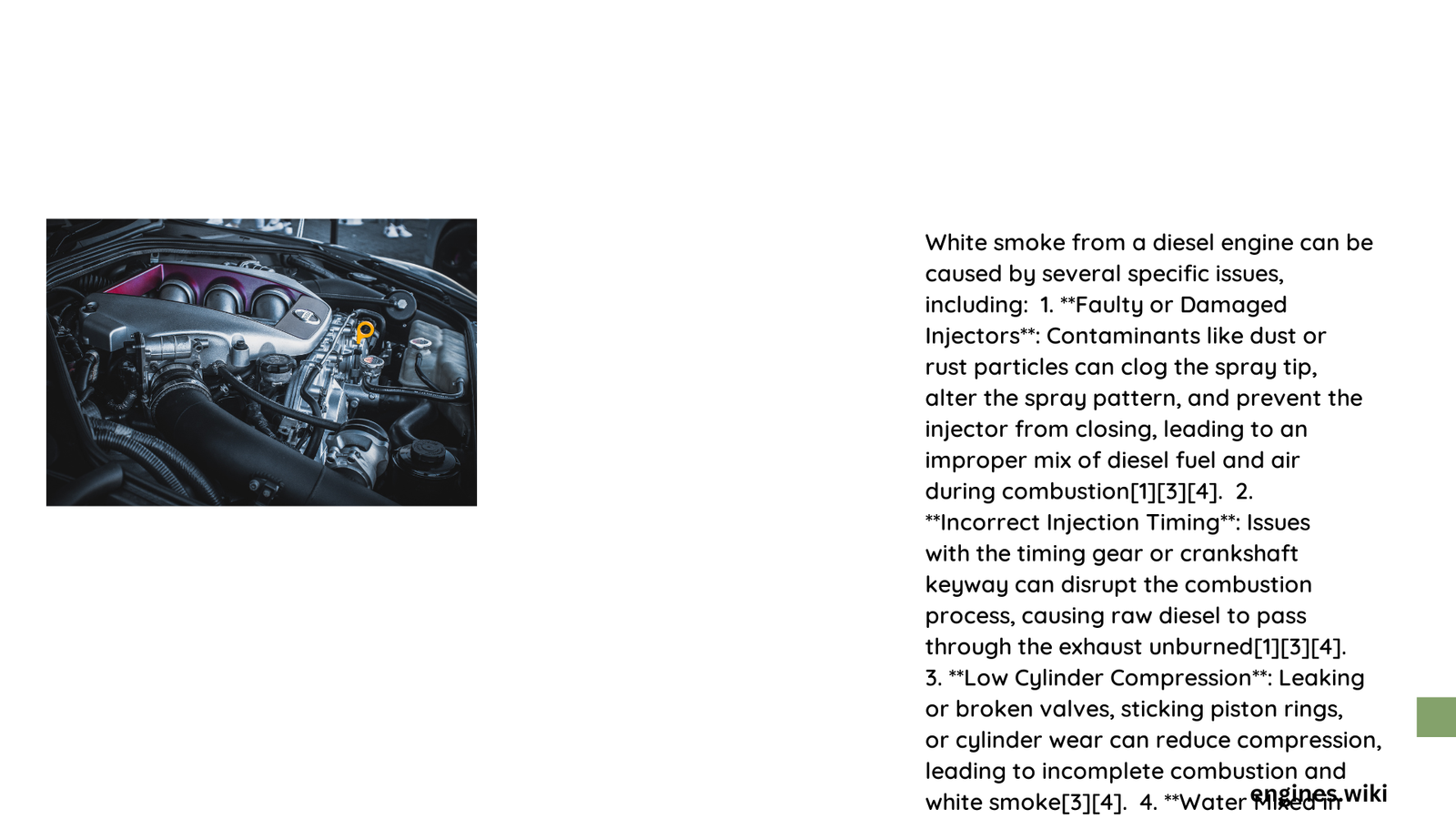White smoke emerging from a diesel engine signals complex mechanical issues that demand immediate attention. Diesel engines produce white smoke due to multiple potential problems, ranging from fuel system contamination to critical internal component failures. Understanding these root causes is essential for preventing extensive engine damage and maintaining optimal vehicle performance.
What Triggers White Smoke in Diesel Engines?
Can Fuel Contamination Cause White Smoke?
Fuel Quality Impact
– Water Intrusion: Even minimal water presence (100 ppm) disrupts combustion
– Particulate Contamination: Dust and rust particles obstruct fuel injector functionality
– Microbial Growth: Contaminants can develop bacterial colonies in fuel systems
| Contamination Type | Potential Consequences | Detection Method |
|---|---|---|
| Water | Incomplete combustion | Fuel filter inspection |
| Dirt Particles | Injector clogging | Visual fuel system examination |
| Rust | Spray pattern disruption | Comprehensive fuel analysis |
How Do Coolant Leaks Produce White Smoke?
Coolant System Failure Indicators
– Sweet-smelling exhaust emissions
– Consistent white smoke during engine operation
– Rapid coolant level reduction
Diagnostic Approach:
1. Pressure test cooling system
2. Inspect head gasket integrity
3. Check for external and internal coolant leaks
4. Evaluate cylinder head condition
What Role Do Injectors Play in White Smoke Generation?
Injector Malfunction Characteristics
– Improper fuel spray patterns
– Inconsistent fuel delivery
– Partial or complete injector failure
Technical Assessment Methods:
– Advanced diagnostic scanning
– Individual injector performance testing
– Compression and fuel pressure evaluation
Can Air Intake Problems Cause White Smoke?
Air System Disruption Factors
– Restricted air intake pathways
– Compromised air filter performance
– Manifold pressure inconsistencies
Comprehensive Diagnostic Checklist:
– Measure airflow rates
– Inspect intake manifold seals
– Evaluate turbocharger functionality
– Check air filter condition
Critical Maintenance Recommendations

Preventive Strategies:
– Regular fuel system cleaning
– Quarterly comprehensive engine diagnostics
– Timely replacement of critical components
– Use high-quality diesel fuel
– Maintain strict coolant system integrity
Technical Insights
White smoke typically indicates unburned or partially combusted fuel, suggesting complex mechanical interactions within the diesel engine’s intricate systems. Professional diagnostic equipment and expert interpretation remain crucial for accurate problem identification.
Warning Signs Requiring Immediate Attention
- Persistent white smoke
- Reduced engine performance
- Unusual exhaust odors
- Increased fuel consumption
- Coolant level fluctuations
Cost Considerations
Potential Repair Expenses:
– Injector replacement: $500 – $2,000 per injector
– Head gasket repair: $1,000 – $3,000
– Complete engine overhaul: $4,000 – $8,000
Professional Recommendation
While DIY diagnostics provide initial insights, complex diesel engine issues demand professional mechanical expertise. Certified diesel technicians possess specialized diagnostic tools and comprehensive knowledge to accurately identify and resolve white smoke generation sources.
Reference:
- https://www.finditparts.com/blog/white-smoke-from-diesel-engine-common-causes-and-how-to-fix-them
- https://msaford.com/blog/diesel-engine-why-do-i-see-white-smoke/
- https://www.capitalremanexchange.com/causes-of-diesel-engine-smoke-by-color/
